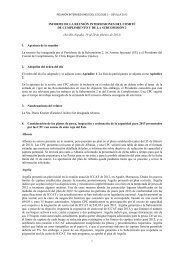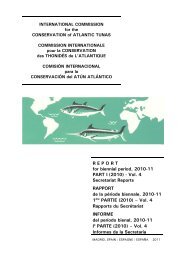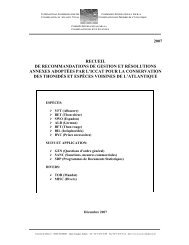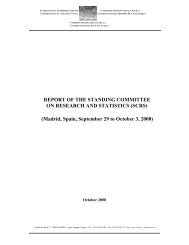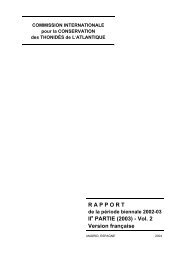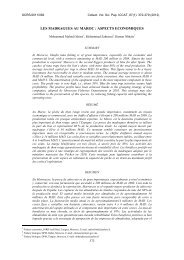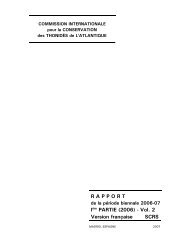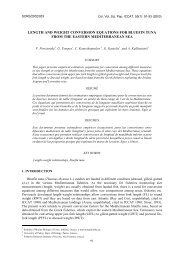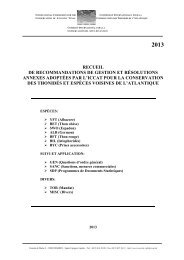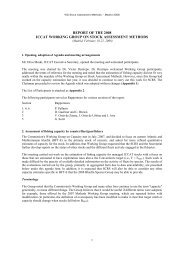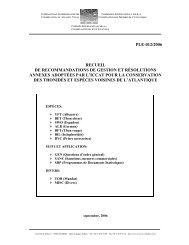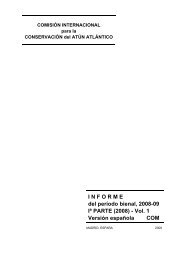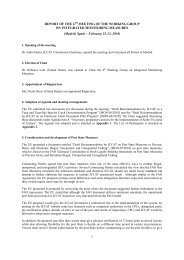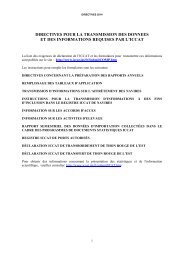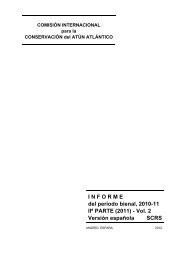E - Iccat
E - Iccat
E - Iccat
Create successful ePaper yourself
Turn your PDF publications into a flip-book with our unique Google optimized e-Paper software.
3 rd WG FUTURE OF ICCAT – MADRID 2012<br />
An abstention is an expression of the refusal to vote in favour or against a proposal, but it is an expression<br />
nevertheless. By assimilating a failure to vote to an abstention, the current version of Rule 9 might have the<br />
effect of discouraging the members who may wish to abstain from responding to an inter-sessional vote, even if<br />
a response is required by paragraph 14 of Rule 9, given that their failure to do so will have the same effect as<br />
abstaining. Furthermore, assimilating the failures to vote to abstentions assumes that all the non-respondent<br />
would have abstained and therefore ignores the possibility that some non-respondent might have voted in favour<br />
or against a proposal, but just failed to do so.<br />
It is proposed to modify paragraph 15 of Rule so that a member’s failure to respond would not be recorded as an<br />
abstention. Instead, a failure to respond could be recorded as such and not be considered for the constitution of<br />
the quorum, not unlike a member who is not present for a vote at a meeting 1 .<br />
B) Possible drafting suggestions<br />
12. Members shall promptly acknowledge receipt of the proposal or request transmitted under paragraph 11. If<br />
no acknowledgment is received within 10 days of the date of transmittal, the Executive Secretary shall<br />
retransmit the proposal or request and shall use all additional means available to ensure that the transmittal<br />
has been received. Confirmation by the Executive Secretary that the transmittal has been received shall<br />
be deemed conclusive regarding the inclusion of the member in the quorum for the purpose of the<br />
relevant intersessional vote.<br />
13. Within 10 days of the initial transmittal of a proposal pursuant to paragraph 11 (a), in accordance with Rule<br />
7(d), any member may request an inter-sessional vote on the chairman’s determination of the necessity of<br />
considering the proposal intersessionally made under paragraph 9, to be subject to the majority decision rule<br />
contained in paragraph 2. [If no such request is received, the Executive Secretary shall inform all<br />
members and indicate the number of days remaining to respond to the proposal.]<br />
14. Members shall respond within 40 2 days of the date of the initial transmittal of a proposal or request,<br />
indicating whether they cast an affirmative vote, cast a negative vote, abstain from voting, or require<br />
additional time to consider the matter. [If no request for an extension of time has been received within 30<br />
days of the initial transmittal of a proposal or request, the Executive Secretary shall inform all<br />
members of the approaching expiration of the 40 day period, indicate which responses have yet to be<br />
received and remind the members of the requirement to respond.]<br />
14 bis If a member of the Commission requests additional time for consideration, a further 30 days shall be<br />
allowed from the expiration of the initial 40 day period. No additional extensions of time beyond one 30 day<br />
extension will be permitted 3 . In the event of such an extension, the Executive Secretary shall [indicate which<br />
responses have yet to be received and] inform all members of the final date by which responses must be<br />
received.<br />
15. If no reply from a member is received within 40 days of transmittal, or by the extended deadline specified by<br />
the Executive Secretary in the event of a 30 day extension to consider the proposal, that member shall be<br />
recorded as having abstained and shall [not] be considered part of the quorum for voting purposes.<br />
C) Additional measures to encourage participation of members in inter-sessional votes<br />
In addition to modifying the Rules of Procedures, further means could be envisaged to encourage members to<br />
respond in an inter-sessional vote. Compliance of members with Rules of Procedures could be assessed during<br />
the annual meeting of the Commission. The Secretariat could also make use of the different means envisaged in<br />
the current Rules of Procedures to secure the greatest amount of responses from Contracting Parties (e.g. secure<br />
web-site, an e-mail with a voting button sent as a reminder, etc.).<br />
1 Alternatively, a failure to vote by a member, provided that the Secretariat has confirmed receipt of the inter-sessional vote transmittal by<br />
that member, could also be counted either as: 1) a vote in favour of a proposal; 2) a vote neither in favour nor against a proposal (1/2 vote in<br />
favour and 1/2 vote against, having a neutral effect on the outcome of a proposal), or; 3) an undetermined response (1/3 vote in favour, 1/3<br />
vote against and 1/3 abstention, having a slight effect (1/3 of a vote) against a proposal).<br />
2 The duration of the voting period and of an extension to the voting period were not considered as part of this proposal but could be<br />
reviewed to improve the efficiency of the process.<br />
3 The possibility of allowing an additional extension should the quorum not be satisfied was not considered as part of this proposal but could<br />
be envisaged.<br />
127



